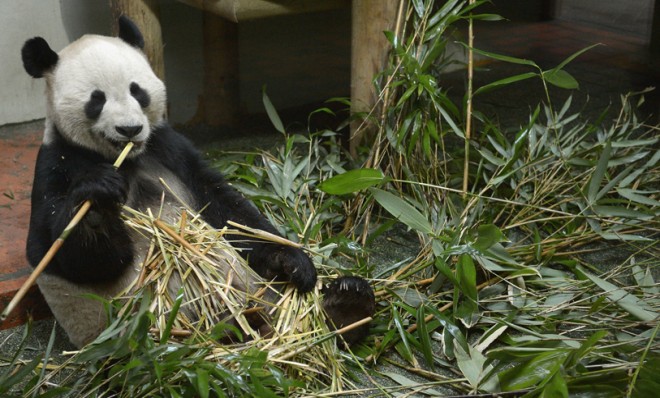Panda poop: The missing link for cheap, renewable energy?
All that bamboo-chewing could be good for something after all

A free daily email with the biggest news stories of the day – and the best features from TheWeek.com
You are now subscribed
Your newsletter sign-up was successful
Pandas may hold the key to efficiently and cheaply turning plants into renewable energy — in their feces.
This week, at the annual meeting of the American Chemical Society in Indianapolis, Ashli Brown, a biochemist from Mississippi State University, presented research she's doing with the feces of Ya Ya and Le Le, two pandas at the Memphis Zoo.
"We have discovered microbes in panda feces that might actually be a solution to the search for sustainable new sources of energy," she told attendees, according to National Geographic. Apparently these microbes are very good at breaking down plant material used to make biofuels like ethanol.
The Week
Escape your echo chamber. Get the facts behind the news, plus analysis from multiple perspectives.

Sign up for The Week's Free Newsletters
From our morning news briefing to a weekly Good News Newsletter, get the best of The Week delivered directly to your inbox.
From our morning news briefing to a weekly Good News Newsletter, get the best of The Week delivered directly to your inbox.
The finding could solve a tough problem for scientists. Biofuels are often made from crops like corn and soy beans that can also be used for food. Because scientists are reluctant to dip into the food supply, they've had to develop ways to break down the inedible parts of these crops, like the corn cobs and stalks.
But those materials are tough. They have to be cooked or treated with substances like acid to turn them into simple sugars, which are then fermented into ethanol or other biofuels. The process is expensive, and not particularly energy-efficient — which kind of defeats the point.
The microbes in panda poop, however, could break down these materials a lot more efficiently and at a lower cost.
What's so special about panda waste? For one, an adult panda eats 20 to 40 pounds of tough, fibrous bamboo each day. It spends about 12 of each 24 hours munching away.
A free daily email with the biggest news stories of the day – and the best features from TheWeek.com
There are other factors that make the microbes in panda poop more effective than the microbes in, say, cow dung:
Pandas also have short digestive tracts for such large animals, and just a single stomach chamber, [Candace Williams, one of the researchers] added. (Cows, in comparison, use four different stomach regions to gradually remove the energy from grass.) "This means their bacteria have to be even more potent at breaking down the material quickly," she said, "making them very efficient and perhaps even more promising for biofuel production." [National Geographic]
The scientists hope to use the microbes themselves, or the enzymes the bacteria makes to digest the plant material.
And if the prospect of cheap, efficient biofuel production isn't enough, there's another reason these microbes appeal to scientists: Pandas are an endangered species — the world is down to about 2,500 of them. "Researching the poop microbes may also lead to the discovery of new information that can be used to keep pandas healthy," says Nature World News.
Now, if only we could convince them to procreate.
Carmel Lobello is the business editor at TheWeek.com. Previously, she was an editor at DeathandTaxesMag.com.